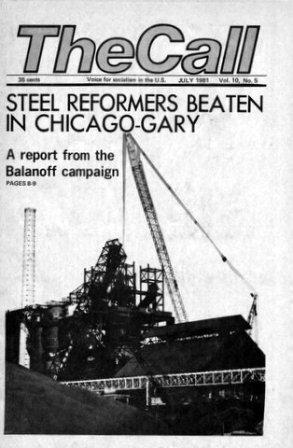
First Published: The Call, Vol. 10, No. 5, July 1981.
Transcription, Editing and Markup: Paul Saba
Copyright: This work is in the Public Domain under the Creative Commons Common Deed. You can freely copy, distribute and display this work; as well as make derivative and commercial works. Please credit the Encyclopedia of Anti-Revisionism On-Line as your source, include the url to this work, and note any of the transcribers, editors & proofreaders above.
I thought John Martin’s article in the April Call had quite a few important strengths, as well as a number of serious weaknesses. The strengths were:
1) Martin’s recognition that CPML’s self-conception of itself as the vanguard party was a serious error.
2) Martin correctly speaks to the one-sided, ultra-left way in which CPML and others used the formulation “party-building is our central task” to negate the importance of uniting with other progressive forces and to over-exaggerate the importance of our own work.
3) Martin’s view that for M-L organizations to unite, they need basic unity, but not total unity is also a step forward. There is too much inexperience and lack of thorough, critical investigation of questions for people to expect complete unity before they unite.
Midway through his article, Martin states that the “essence of the crisis in Marxism is the struggle of Marxists-Leninists to move from merely restating the “principles” of Marxism to applying a correct methodology and developing a realistic strategy and tactics for the revolutionary movement.” I strongly agree with this statement. The question is, though, what has prevented our movement from doing this?? Martin says ultra-leftism has been mainly responsible.
While there have been many ultra-left errors in the M-L movement in the 70s, ultra-leftism is an inadequate explanation for the source of our errors. I think most groups “merely restate the principles of Marxism” in a mindless, uncritical way because to them the world has already been correctly and completely analyzed by our infallible, all-knowing leaders–Marx, Lenin, Stalin, and either Mao, Hoxha, Deng or Brezhnev.
While I would support most of Marx and Lenin’s contributions, much of Mao’s, and little or none of Stalin, Hoxha, Deng or Brezhnev’s–the point is that Marxist-Leninists today do not adequately understand the world to develop a strategy for revolution (particularly in advanced capitalist countries). And the simple restating of the principals of Marxism (whether they’re Chinese, Soviet or Albanian versions) does little to help us understand the world any better.
This mindless, uncritical copying of theories formulated on the basis of different conditions has a long history in the communist movement which comes out of the Stalinist conceptions of the Party. Under Stalin’s leadership the lines of the international communist movement (i.e., Stalin’s lines) were totally adopted by all CPs despite often very different concrete conditions. At times these lines were “ultra-left” and at other times “right” but the point is that these lines were formulated without concrete analysis of concrete conditions and therefore could not and did not push forward a revolutionary perspective.
Despite the improvements in Martin’s and CPML’s perspective, they are still not dealing with what I see as their most fundamental error–their uncritical sup-port of the Chinese; and their continued, support of a theory which sees the Soviet Union as the main danger and calls for an alliance with the U.S. against the Soviet Union.
J.S., Chicago
* * *
The Call comments: We agree that dogmatism hindered the CPML from developing its analysis of American realities. But it is also wrong to reject other countries’ experience, if it happens to be useful.
We would ask you to pose an analysis of class forces in the world that is more helpful than the theory of the three worlds. All those who have rejected it thus far have ended up with some form of a two camp view, either the Albanian version which sees die camps as the bourgeoisie and the proletariat (with them as representative of the latter) or a view which places the Soviet Union as some form of ally of national liberation struggles.
You seem to say that the CPML calls for an alliance with the U.S. against the Soviet Union. Where? Did you read the June 30, 1980, issue of The Call which reviewed the book Sooner or Later?